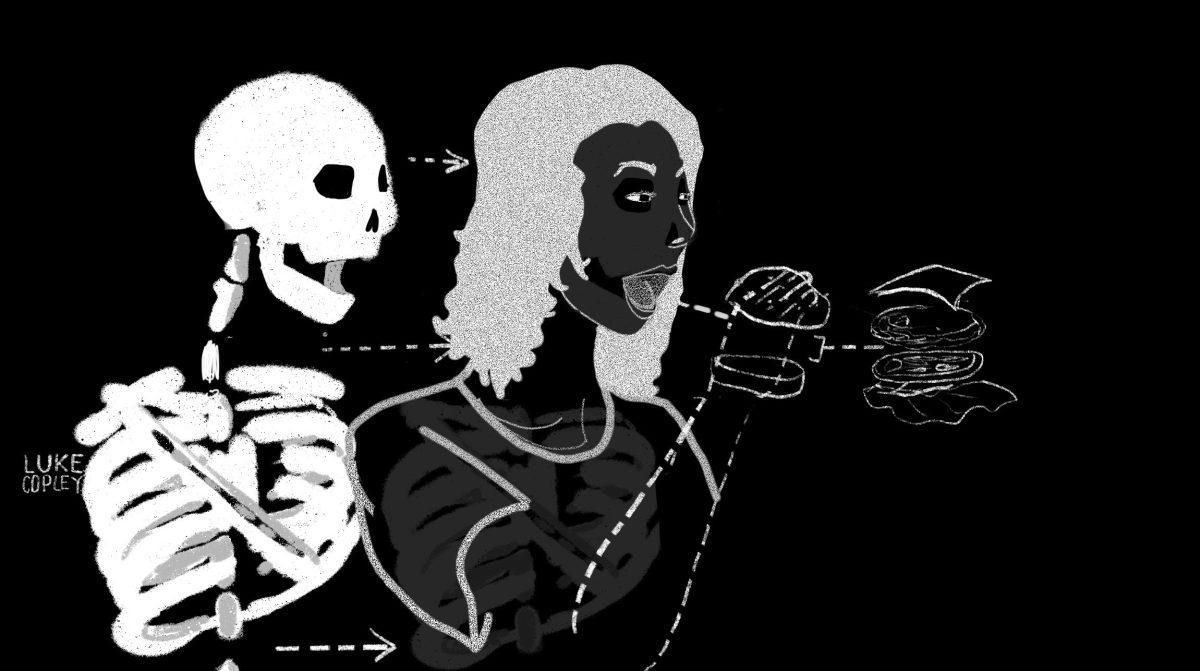Before embarking on your journey through college, I am sure you were all once warned of the looming, ever-present threat that is: The Freshman Fifteen.
As I am sure it was for many of you, my transition from plentiful, home cooked meals to dorm room ramen and family sized bags of Cheeto puffs was an unpleasant one. As college students, we learn to sacrifice our health and well-being for the sake of convenience and comfort. We find time in our busy schedules to scarf down whatever is within arm’s reach, and we learn to make do with what we can afford.
While making room for an extra 15 pounds is hardly the end of the world, behind this playful adage lurks a more sinister truth regarding the eating habits of college students, a truth that I believe is entitled to more recognition.
According to a 2011 study published in the Journal of American College Health, between 8% and 17% of college students suffer from an eating disorder. While these statistics may seem minuscule on their own, their weight becomes crushing in context.
As of fall 2022, 22,649 students were enrolled at Mississippi State University. Assuming this number has remained consistent, my research suggests that an estimated 1,811 to 3,850 MSU students are currently suffering from full-blown eating disorders.
The grumbling of empty stomachs in 11 a.m. classrooms echo these daunting numbers.
We all recognize that eating disorders are bad. Rest assured, no one is sitting at home right now, thinking about all the good that eating disorders do, waiting for me to come along and convince them otherwise. However, what many people fail to realize is the severity and commonality of such disorders.
Somewhere along the way, someone spread the misconception that eating disorders arise solely from a lack of self-esteem. This outdated perspective perpetuates the stereotype that eating disorders are restricted to thin, sickly-looking girls. By pushing forth this narrative, we leave men and other seemingly healthy people to fend for themselves.
What I implore students to recognize is that eating disorders are never so simple. Oftentimes, eating disorders stem from a lack of control and the desire to regain it. This makes college students a particularly susceptible group for developing them.
I was 17 when I moved from Georgia to Mississippi on my own to go to college. I had no job, no friends or family in the state and no backup plan for what to do if things went awry. Although I was given full independence over my life, at that moment, I felt like I was completely stripped of my control. This is an all too familiar feeling for students.
When teenagers are removed from the watchful eyes of their parents and given the label of “adult,” they are stripped of their structure, given demanding workloads and pushed entirely into unfamiliar environments. This is enough to make anyone feel at a loss for power.
I coped with this by throwing myself into 18 hours of classes, getting two jobs and spending a lot of time driving through dark Mississippi roads alone and in silence at 2 a.m. In comparison, I think I got off lucky. Many students, however, find a sense of control through fixating on their eating habits. This illusion of control is fleeting, though, as eating disorders take over the mind long before they ever touch the body.
Let’s go back a moment and revisit our statistics. If between 1,811 and 3,850 students at MSU are currently suffering from eating disorders, what about the students struggling with disordered eating? Falling on the lower end of the spectrum, disordered eating entails skipping meals, eating at irregular hours, binging, fasting and putting nutrition on the back burner. Essentially, disordered eating sums up the life of the average college student.
Once we factor in a couple thousand students struggling with this lesser extreme, we are closing in on a large fraction of the student body, and that does not include the 40% of college students Forbes calculated who struggle with food insecurity.
To get a better idea of this number, I conducted a small survey of college students’ eating habits and asked how many meals they ate each day. Of the 63 respondents, 50 reported that they ate less than three. Many students stated the reasons they eat less is due to a lack of time and money, as well as increased stress.
Despite the often-unintentional nature of disordered eating, it is still just as dangerous and serious as it would be if intentional. As students, we normalize this type of behavior to such an extreme extent that most of us find no problem with it. Habitual disordered eating is a precursor to developing fully-fledged eating disorders, and it should be treated as such.
Eating disorders have one of the highest mortality rates of all mental illnesses, according to the Eating Disorders Coalition. Although they are extremely common, these disorders are hardly ever brought to light until it is too late. If research estimates a minimum of 1,811 students on MSU’s campus are suffering, it is imperative that more attention is drawn to this issue.
It is not enough just to know that eating disorders are bad. There are currently no recognized support groups or clubs on campus dedicated to bringing awareness to this issue. To help our peers and loved ones, this has to change. Students must advocate for one another and help to create a support system on campus for those who are struggling. The only way to shed light on this issue is to talk about it.
Eating disorders are too casual in college
Eating disorders are too casual in college
About the Contributor

Cadence Harvey, Former Managing Editor
Cadence Harvey served as the Managing Editor from 2023 to 2024.
Donate to The Reflector
Your donation will support the student journalists of Mississippi State University. Your contribution will allow us to purchase equipment and cover our annual website hosting costs.






















































































